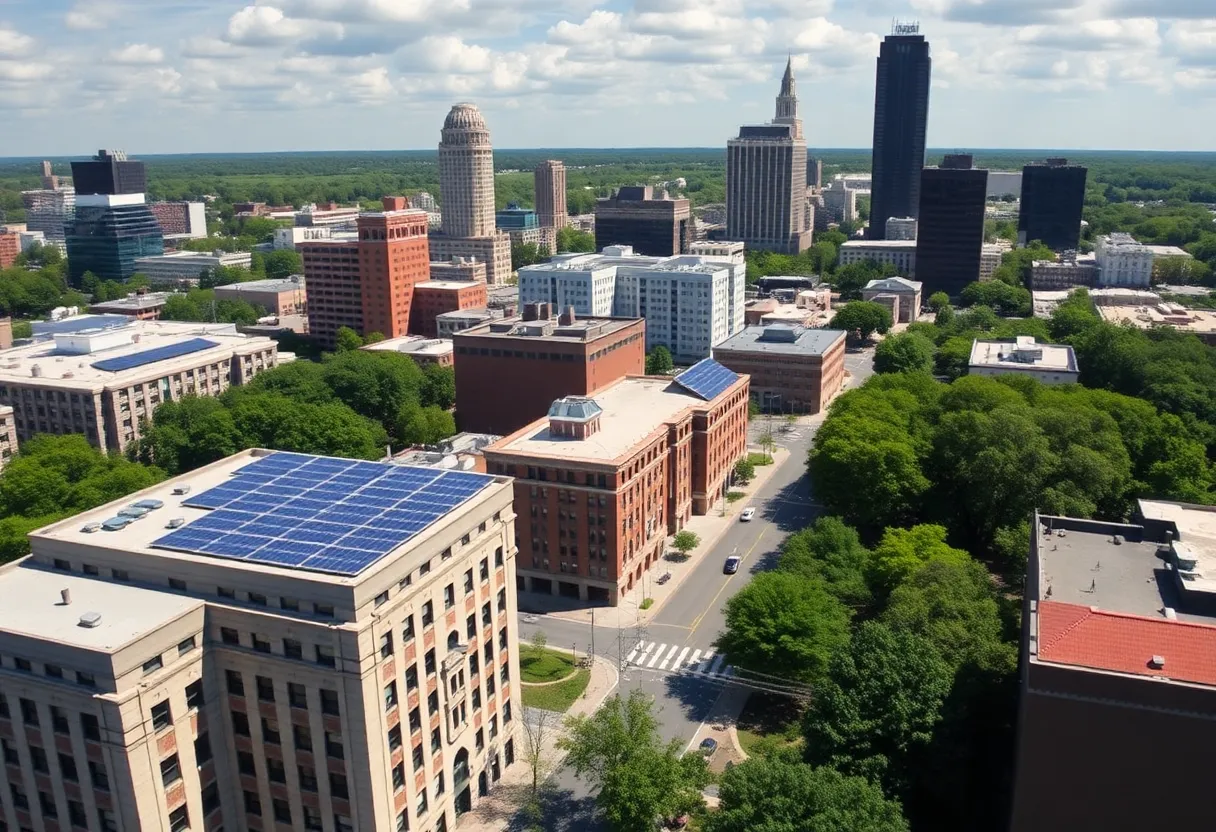News Summary
Columbia, SC is focusing on renewable energy and infrastructure improvements as it navigates economic challenges posed by the new Trump administration. City officials are optimistic about funding opportunities from the Inflation Reduction Act while addressing pressing issues like water contamination from ‘forever chemicals.’ The city has set ambitious renewable energy goals and is strategizing to manage the associated costs amid uncertainty over future federal support.
Columbia City Gears Up for a Green Future Amid Economic Uncertainty
In the heart of South Carolina, city officials in Columbia are bracing for a significant energy transition as they navigate the challenges brought on by the new Trump administration. The city has recently been in discussions focusing on critical issues, including tariffs, renewable energy policies, and regulations related to the notorious “forever chemicals” contaminating drinking water.
Strategizing for the Future
During a recent work session, the City Council was briefed by a lobbyist, who shared insights into possible priorities for 2025 and beyond. This meeting highlighted the city’s commitment to investing in renewable energy and green infrastructure. With the Inflation Reduction Act (IRA) tax incentives presented by the Biden administration, city officials are hopeful that these federal benefits will help fund essential projects aimed at reducing reliance on traditional fossil fuels.
Mayor Daniel Rickenmann underlined the significance of these investments, emphasizing that the IRA provides valuable tax incentives for cities and businesses willing to embrace clean energy infrastructure. This initiative plays a crucial role in shifting Columbia toward a more sustainable energy future, aligning the city with global trends in energy consumption.
Cost-Savings: A Bright Spot in the Plan
Councilman Peter Brown raised important points about the cost benefits associated with renewable energy investments, drawing comparisons to costly failed nuclear projects like the V.C. Summer nuclear plant. Such reflections indicate a growing awareness among leaders about the financial implications of energy choices for the city.
However, there remains a cloud of uncertainty over the future of the IRA under Trump’s administration. Campaign rhetoric has already labeled it a “Green New Scam,” leaving many to ponder what changes might come that could affect these initiatives and their associated funding.
Innovative Energy Projects on the Horizon
Columbia officials are presenting exciting plans to integrate solar power at various city facilities, such as the wastewater plant and parking garages. In addition, the city aims to sell biogas, expanding its renewable energy portfolio and generating additional revenue streams.
With the possibility that tax incentives from the IRA may vanish, city leaders believe that several projects may be at risk—all of which raises concerns about the affordability of necessary improvements to local infrastructure.
Tackling “Forever Chemicals”
Beyond energy initiatives, Columbia faces another pressing issue: the startling $150 million cost to comply with Environmental Protection Agency (EPA) regulations concerning “forever chemicals” in the water supply. These harmful PFAS chemicals have led the city to take decisive action, including filing a lawsuit against textile and chemical manufacturers responsible for the pollution.
Instead of joining a nationwide lawsuit, city officials opted for a more calculated approach, asserting that current settlements would not cover the extensive damages. Depending on regulatory changes that may arise under the Trump administration, there could be potential cost reductions related to the cleanup efforts for these pollutants.
Tariffs and Their Impact on Columbia
Another layer of concern for Columbia’s City Council involves President Trump’s proposed tariffs. Discussions regarding tariffs ranging from 10-20% on all imports, with higher rates on Chinese goods, could significantly impact construction costs for projects throughout the city, including a new automotive plant set to open in Blythewood. It’s a precarious balancing act as the city strives to incorporate more renewable energy while being mindful of expenses impacting local taxpayers.
Renewable Energy Goals: A Balancing Act
Columbia has set an ambitious goal to achieve 40% renewable energy by 2035, which the city has realistically adjusted down from an earlier target of 100% by 2030. Leaders are cautious after recognizing the financial strains that such high goals may impose on residents. As city officials prepare to present a revised renewable energy ordinance to the City Council in February, they face the challenge of enhancing green energy ambitions while ensuring fiscal responsibility toward residents.
As Columbia navigates these tumultuous waters, city leaders are committed to forging a brighter, more sustainable future for all residents, no matter the political landscape. The focus is not only on renewable energy but also on practical measures that make sense financially for the local community.
Deeper Dive: News & Info About This Topic
HERE Resources
WaterSC Listening Session in West Columbia
Duke Energy Appoints Tim Pearson as South Carolina State President
Greenville’s GE Vernova Partners with Dominion Energy to Modernize Saluda Hydro Power Plant
Duke Energy Appoints Tim Pearson as New South Carolina State President Amid Leadership Changes
Columbia Public Service Commission to Host Transmission Planning Briefing on January 21, 2025
Central Electric Power Cooperative Secures $500 Million for Renewable Energy Transition in Columbia, S.C.
South Carolina Ranked as the Least Energy Efficient State in the Nation
Columbia Residents Renew Hope for V.C. Summer Nuclear Project Following Positive Condition Report
Columbia Secures $8.7 Million Grant to Boost Local Climate Initiatives
SC NEXUS Secures $45 Million in Federal Funding
Additional Resources
- Utility Dive: Local Opposition to Renewable Energy Projects Growing
- Climate Change News: Colombia’s $40 Billion Energy Transition Plan
- Columbia Missourian: Columbia Unlikely to Meet Renewable Energy Goals
- Wikipedia: Renewable Energy
- Encyclopedia Britannica: Renewable Energy

Author: STAFF HERE Chapin
CHAPIN STAFF WRITER The CHAPIN STAFF WRITER represents the experienced team at HEREchapin.com, your go-to source for actionable local news and information in Chapin, Lexington County, and beyond. Specializing in "news you can use," we cover essential topics like product reviews for personal and business needs, local business directories, politics, real estate trends, neighborhood insights, and state news affecting the area—with deep expertise drawn from years of dedicated reporting and strong community input, including local press releases and business updates. We deliver top reporting on high-value events such as the Chapin Christmas Parade, Fourth of July Celebration, and the Chapin Fall Festival. Our coverage extends to key organizations like the Chapin Chamber of Commerce and the Lexington School District One, plus leading businesses in retail and recreation that power the local economy such as Lake Murray Tourism and the Chapin Visitor Information. As part of the broader HERE network, including HEREaiken.com, HEREbeaufort.com, HEREchapin.com, HEREcharleston.com, HEREclinton.com, HEREcolumbia.com, HEREgeorgetown.com, HEREgreenwood.com, HEREgreenville.com, HEREhiltonhead.com, HEREirmo.com, HEREmyrtlebeach.com, HEREnewberry.com, HERErockhill.com, HEREspartanburg.com, HEREaustin.com, HEREcollegestation.com, HEREdallas.com, HEREhouston.com, and HEREsanantonio.com, we provide comprehensive, credible insights into South Carolina's dynamic landscape.





